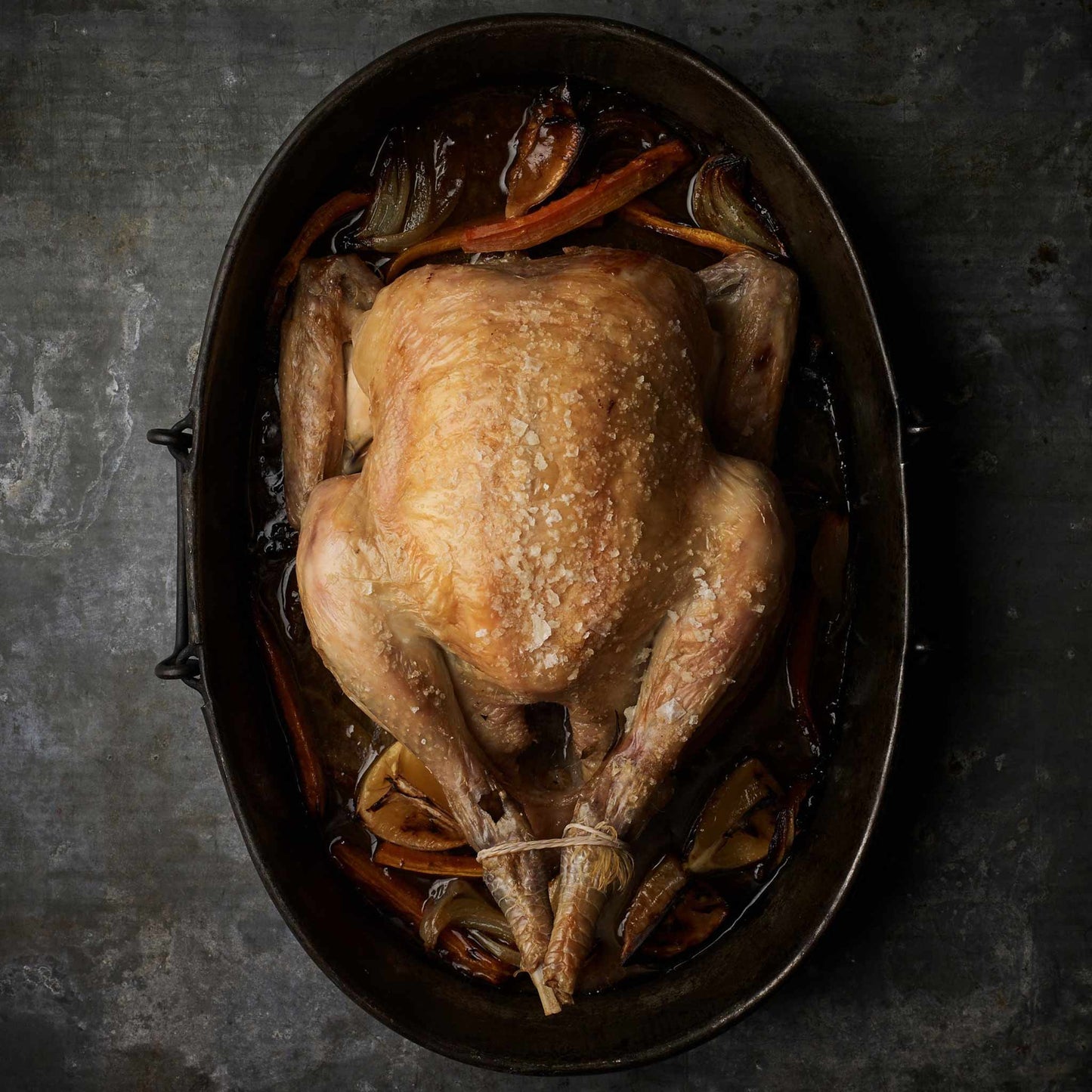We source our chicken from one farm in Leicestershire. The farm is Pasture for Life certified and rears truly free range, outdoor birds.

Why is the winter solstice so important?
The December solstice happens at the same instant for everyone, everywhere on Earth – and this year the winter solstice occurs on Monday December 21, at 10:02 GMT in the Northern Hemisphere. This marks the official start of winter.
The winter solstice happens every year when the Sun reaches its most southerly declination of -23.4 degrees. In other words, it is when the North Pole is tilted farthest away from the Sun, delivering the fewest hours of sunlight of the year.
The Sun is directly overhead of the Tropic of Capricorn in the Southern Hemisphere during the December solstice and is closer to the horizon than at any other time in the year, meaning shorter days and longer nights.
For our ancestors this day had great significance and many of our Christmas traditions came from pre-christian pagan ones that were adapted to new mythologies.
Why did this matter to ancient peoples?
Ancient people were hunters and spent most of their time outdoors. The seasons and weather played a very important part in their lives. Because of this many ancient people had a great reverence for, and even worshipped the sun. The Norsemen of Northern Europe saw the sun as a wheel that changed the seasons. It was from the word for this wheel,houl, that the word yule is thought to have come. At mid-winter the Norsemen lit bonfires, told stories and drank sweet ale.
The ancient Romans also held a festival to celebrate the rebirth of the year. Saturnalia ran for seven days from the 17th of December. It was a time when the ordinary rules were turned upside down. Men dressed as women and masters dressed as servants. The festival also involved decorating houses with greenery, lighting candles, holding processions and giving presents.
The Winter Solstice falls on the shortest day of the year (21st December) and was celebrated in Britain long before the arrival of Christianity. The Druids (Celtic priests) would cut the mistletoe that grew on the oak tree and give it as a blessing. Oaks were seen as sacred and the winter fruit of the mistletoe was a symbol of life in the dark winter months.
It was also the Druids who began the tradition of the yule log. The Celts thought that the sun stood still for twelve days in the middle of winter and during this time a log was lit to conquer the darkness, banish evil spirits and bring luck for the coming year.
How did Christmas come to be celebrated in December?
December 25th is not the date mentioned in the Bible as the day of Jesus's birth; the Bible is actually silent on the day or the time of year when Mary was said to have given birth to him in Bethlehem. The extrabiblical evidence from the first and second century is spare: There is no mention of birth celebrations in the writings of early Christian writers such as Irenaeus (c. 130–200) or Tertullian (c. 160–225). Origen of Alexandria (c. 165–264) goes so far as to mock Roman celebrations of birth anniversaries, dismissing them as “pagan” practices—a strong indication that Jesus’ birth was not marked with similar festivities at that place and time. As far as we can tell, Christmas was not celebrated at all at this point.
In Iranian/Persian culture, the winter solstice is known as 'Yalda Night' or 'Shab-e Chelleh' and it's a time when families and friends come together to eat, drink and recite poetry. Shab-e Chelleh means 'night of forty' as it happens forty nights into winter. The word Yalda means 'birth' and comes from early Christians living in Persia celebrating the birth of Jesus around this time.
The Roman Festival of Saturnalia took place between December 17th and 23rd and honoured the Roman god Saturn. The Romans also thought that the Solstice took place on December 25th. It's also thought that in 274 the Roman emperor Aurelian created 'Dies Natalis Solis Invicti' (meaning 'birthday of the unconquered sun') also called 'Sol Invictus' and it was held on December 25th.
Because of the dates, some people say that the Christians 'took over' December 25th from these Roman festivals and/or Yule. However, there are records going back to around 200 of early Christians connecting the Nisan 14 to the 25th March, and so 25th December was a 'Christian' festival date many years before 'Sol Invictus'! (More recent studies have also found that the 'Sol Invictus' connection didn't appear until the 12th century and it's from one scribbled note in the margins of a manuscript. There's also evidence that 'Sol Invictus' might also have happened in October and not December anyway!)
Most of the world uses the 'Gregorian Calendar' implemented by Pope Gregory XIII in 1582. Before that the 'Roman' or Julian Calendar was used (named after Julius Caesar). The Gregorian calendar is more accurate than the Roman calendar which had too many days in a year! When the switch was made 10 days were lost, so that the day that followed the 4th October 1582 was 15th October 1582. In the UK the change of calendars was made in 1752. The day after 2nd September 1752 was 14th September 1752.
Many Orthodox and Coptic Churches still use the Julian Calendar and so celebrate Christmas on the 7th January (which is when December 25th would have been on the Julian calendar). And the Armenian Apostolic Church celebrates it on the 6th January! In some part of the UK, January 6th is still called 'Old Christmas' as this would have been the day that Christmas would have celebrated on, if the calendar hadn't been changed. Some people didn't want to use the new calendar as they thought it 'cheated' them out of 11 days!
Christians believe that Jesus is the light of the world, so the early Christians thought that this was the right time to celebrate the birth of Jesus. They also took over some of the customs from the Winter Solstice and gave them Christian meanings, like Holly, Mistletoe and even Christmas Carols!
St Augustine of Canterbury was the person who probably started the widespread celebration of Christmas in large parts of England by introducing Christianity to the regions run by the Anglo-Saxons in the 6th century (other Celtic parts of Britain were already Christian but there aren't many documents about if or how they celebrated the birth of Jesus). St Augustine of Canterbury was sent by Pope Gregory the Great in Rome and that church used the Roman Calendar, so western countries celebrate Christmas on the 25th December. Then people from Britain and Western Europe took Christmas on the 25th December all over the world!
Rather confusing but somehow all starting to make sense.
So when was Jesus born?
There's a strong and practical reason why Jesus might not have been born in the winter, but in the spring or the autumn! It can get very cold in the winter and it's unlikely that the shepherds would have been keeping sheep out on the hills
During the spring (in March or April) there's a Jewish festival called 'Passover'. This festival remembers when the Jews had escaped from slavery in Egypt about 1500 years before Jesus was born.
Lots of lambs would have been needed during the Passover Festival, to be sacrificed in the Temple in Jerusalem. Jews from all over the Roman Empire traveled to Jerusalem for the Passover Festival, so it would have been a good time for the Romans to take a census. Mary and Joseph went to Bethlehem for the census (Bethlehem is about six miles from Jerusalem)
In the autumn (in September or October) there's the Jewish festival of 'Sukkot' or 'The Feast of Tabernacles'. It's the festival that's mentioned the most times in the Bible! It is when Jewish people remember that they depended on God for all they had after they had escaped from Egypt and spent 40 years in the desert. It also celebrates the end of the harvest. During the festival, Jews live outside in temporary shelters (the word 'tabernacle' come from a latin word meaning 'booth' or 'hut').
So this leads to a more likely date for jesus birth being September. If Jesus was born in September, that would be close to one of the three major pilgrim feasts, that of Succoth, also called Tabernacles or ‘Booths’. This feast commemorates the period of time that Israel lived in tents in the wilderness.



